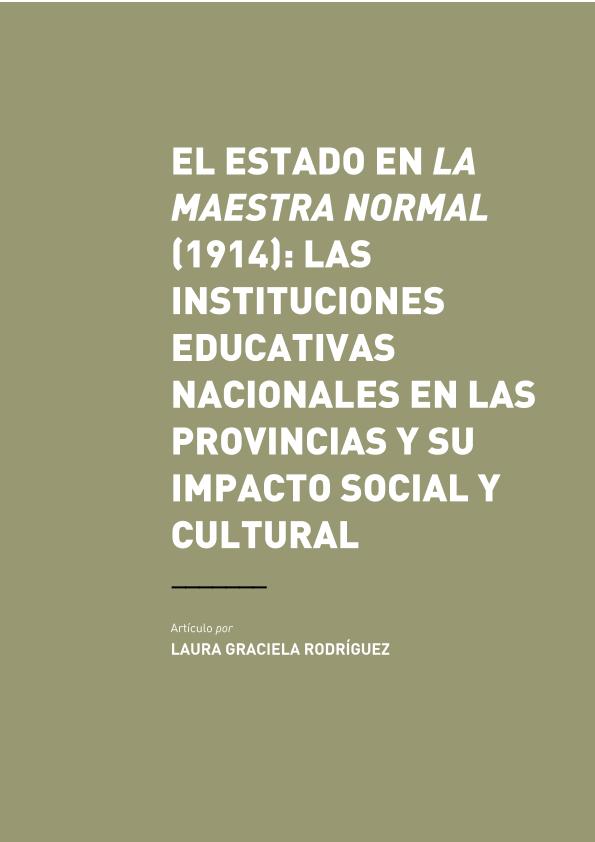Mostrar el registro sencillo del ítem
dc.contributor.author
Rodríguez, Laura Graciela

dc.date.available
2019-10-18T15:47:14Z
dc.date.issued
2018-12
dc.identifier.citation
Rodríguez, Laura Graciela; El Estado en La maestra normal (1914): las instituciones educativas nacionales en las provincias y su impacto social y cultural; Programa Interuniversitario de Historia Política; PolHis; 11; 22; 12-2018; 55-82
dc.identifier.issn
1853-7723
dc.identifier.uri
http://hdl.handle.net/11336/86361
dc.description.abstract
En este artículo analizaremos la novela La maestra normal escrita por Manuel Gálvez y publicada en 1914, y los intercambios que surgieron después entre el autor y Leopoldo Lugones. Pretendemos mostrar cómo este texto y las notas que siguieron, nos permiten conocer de qué manera las instituciones educativas nacionales impactaron en la vida social y cultural de las provincias durante la primera década del siglo XX. Hemos seleccionado esta obra porque el autor la escribió en base a su experiencia como inspector de enseñanza, ocupación que también ejerció Lugones. Debido a este conocimiento, el funcionario y escritor Gálvez nos ofrece una rica y densa descripción del Estado “desde adentro” y en especial, sobre varios aspectos de la vida cotidiana e interna de las escuelas que resultan más difíciles de conocer abordando solamente los documentos oficiales. Asimismo, optamos por incluir la polémica de Gálvez con Lugones porque al calor de la discusión, ambos introdujeron miradas complementarias y matizadas sobre los dichos en la novela, lo que nos devuelve un panorama más complejo acerca de lo que sucedía con los establecimientos educativos nacionales en el interior del país.
dc.description.abstract
In this article, we will analyze the novel La maestra normal written by Manuel Gálvez and published in 1914, and the exchanges between the author and Leopoldo Lugones that arose later. We intend to show how this text and the notes that followed allow us to know how these intellectuals have interpreted the way in which national educational institutions had an impact in the social and cultural life of the provinces during the first decade of the 20th century. We have selected this book because the author wrote it based on his experience as an inspector of education, an occupation that Lugones also exercised. Gálvez offers a rich and dense description of the State "from within", and in particular, on various aspects of the daily and internal life of schools that are more difficult to discover only addressing official documents. Also, we chose to include the polemic of Galvez with Lugones because they introduced complementary and nuanced views on the consideratios in the novel, which gives us a more complex picture about what they thought was happening with the national education establishments in the interior of the country.
dc.format
application/pdf
dc.language.iso
spa
dc.publisher
Programa Interuniversitario de Historia Política
dc.rights
info:eu-repo/semantics/openAccess
dc.rights.uri
https://creativecommons.org/licenses/by/2.5/ar/
dc.subject
ESCUELA NORMAL
dc.subject
COLEGIO NACIONAL
dc.subject
NORMALISMO
dc.subject
MUJERES
dc.subject
ARGENTINA
dc.subject
GÁLVEZ
dc.subject.classification
Otras Ciencias de la Educación

dc.subject.classification
Ciencias de la Educación

dc.subject.classification
CIENCIAS SOCIALES

dc.title
El Estado en La maestra normal (1914): las instituciones educativas nacionales en las provincias y su impacto social y cultural
dc.title
The State in La Maestra Normal (1914): The National Educational Institutions in the Provinces and its Social and Cultural Impact
dc.type
info:eu-repo/semantics/article
dc.type
info:ar-repo/semantics/artículo
dc.type
info:eu-repo/semantics/publishedVersion
dc.date.updated
2019-10-16T14:30:36Z
dc.journal.volume
11
dc.journal.number
22
dc.journal.pagination
55-82
dc.journal.pais
Argentina

dc.journal.ciudad
Mar del Plata
dc.description.fil
Fil: Rodríguez, Laura Graciela. Consejo Nacional de Investigaciones Científicas y Técnicas. Centro Científico Tecnológico Conicet - La Plata. Instituto de Investigaciones en Humanidades y Ciencias Sociales. Universidad Nacional de La Plata. Facultad de Humanidades y Ciencias de la Educación. Instituto de Investigaciones en Humanidades y Ciencias Sociales; Argentina
dc.journal.title
PolHis
dc.relation.alternativeid
info:eu-repo/semantics/altIdentifier/url/http://polhis.com.ar/index.php/PolHis/article/view/319
Archivos asociados
